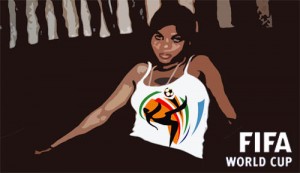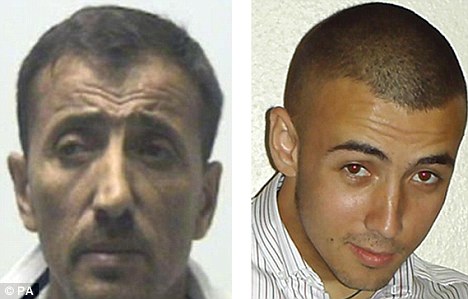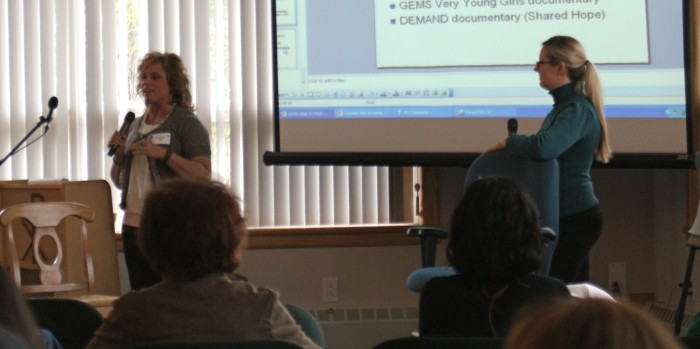Brazil: one of the best destinations in the world. Great people. Beautiful beaches. Rain forests. An abundance of adventures to be had. The question is: what isn’t amazing about Brazil? The sad truth is that human trafficking and sexual exploitation is a major problem in this vacation spot. According to the State Department Trafficking in Persons Report, sex trafficking of Brazilian citizens within and across the country’s borders flourishes. The United Nations Office on Drugs and Crime stated that there is an outrageous industry of child sex tourism and child prostitution in Brazil; “According to a January 2005 report, child prostitution rings operate in 937 municipalities throughout the country.” It doesn’t seem asthough it could get much worse. However, after Spain came out victorious last year in the FIFA World Cup, Brazil was named as the next host of this colossal event in 2014. Unfortunately, this great honor brings booming business for the sex industry.
Right before the World Cup took place in Germany and South Africa, several anti-trafficking and human rights groups spoke up about the increased sexual exploitation that would take place during the tournaments. They encouraged the government and law enforcement agencies to step up and keep a watchful eye. Amnesty International and Human Trafficking.org estimated that between 30,000 and 60,000 children and women would be sexually exploited during the World Cup in Germany. ESPN’s Outside the Lines investigation on the effects of the South Africa World Cup on human trafficking found “more young people have been trafficked either into South Africa from other countries or internally to work in a rapidly growing sex industry because of the month long soccer tournament.” Time Magazine cited a trafficker in South Africa gloating about the anticipated increase in business, “Yeah, this is good! Us people are going to make a lot of money then if you know what you’re doing.” There was criticism of too much hype surrounding the problem and inflated numbers of trafficked victims but that does not negate the correlation between the World Cup and sexual exploitation. The Outside the Lines article above reiterated the words of an ordained minister who runs the conservative Family Policy Institute, “Sex traffickers see the World Cup as an once-in-a-lifetime opportunity to ‘cash in.’”
 Advocates of the anti-trafficking movement will once more begin to voice their concerns about the 2014 FIFA World Cup. The importance of soccer in Brazil will likely increase the tournament’s attendance and subsequently the number of customers for trafficking victims. As mentioned earlier, Brazil already boasts a thriving tourism industry and this World Cup could draw more U.S. attendees than normal because of its proximity. We are looking to determined anti-trafficking advocates and dedicated law enforcement officials to lead the charge in this monstrous challenge to make sure traffickers aren’t the real winners at the 2014 FIFA World Cup.
Advocates of the anti-trafficking movement will once more begin to voice their concerns about the 2014 FIFA World Cup. The importance of soccer in Brazil will likely increase the tournament’s attendance and subsequently the number of customers for trafficking victims. As mentioned earlier, Brazil already boasts a thriving tourism industry and this World Cup could draw more U.S. attendees than normal because of its proximity. We are looking to determined anti-trafficking advocates and dedicated law enforcement officials to lead the charge in this monstrous challenge to make sure traffickers aren’t the real winners at the 2014 FIFA World Cup.
 While there is research documenting how pimps
While there is research documenting how pimps  Shared Hope was joined by District Attorney John Adams, Representative David Maloney, Detective Lee Wiley from the Montgomery Police Department, Julie Janovsky from Polaris Project, and survivor Jennifer Spry. Detective Wiley shared local stories, techniques and information on DMST, while Ms. Janovsky focused on law and policy. The testimony given by Ms. Spry was so powerful that it wrapped up with a standing ovation!
Shared Hope was joined by District Attorney John Adams, Representative David Maloney, Detective Lee Wiley from the Montgomery Police Department, Julie Janovsky from Polaris Project, and survivor Jennifer Spry. Detective Wiley shared local stories, techniques and information on DMST, while Ms. Janovsky focused on law and policy. The testimony given by Ms. Spry was so powerful that it wrapped up with a standing ovation!





